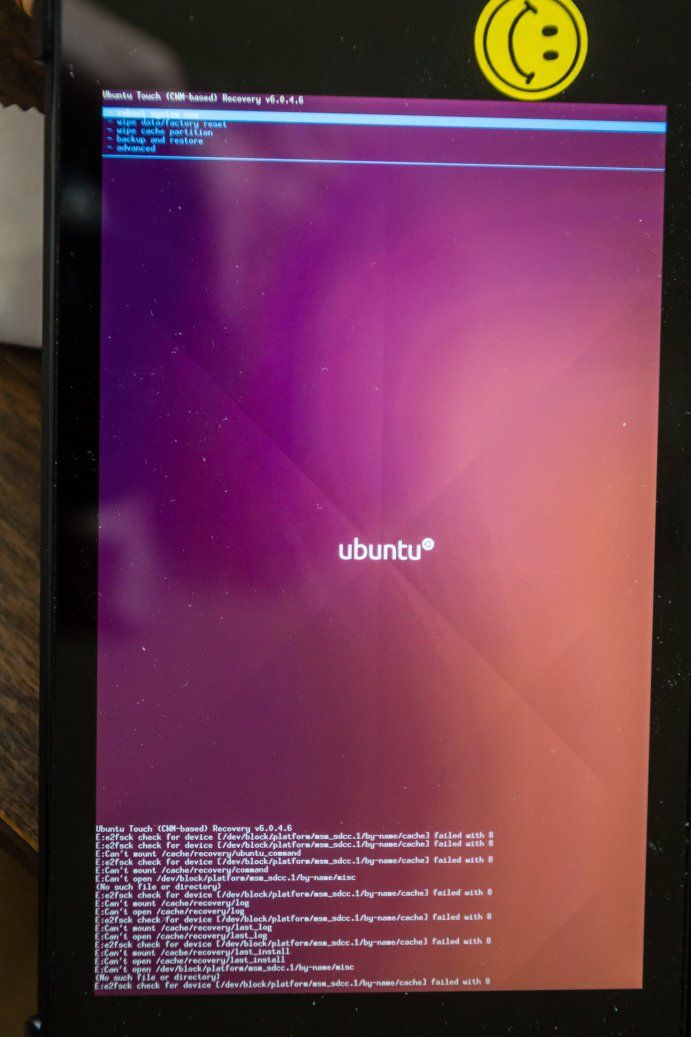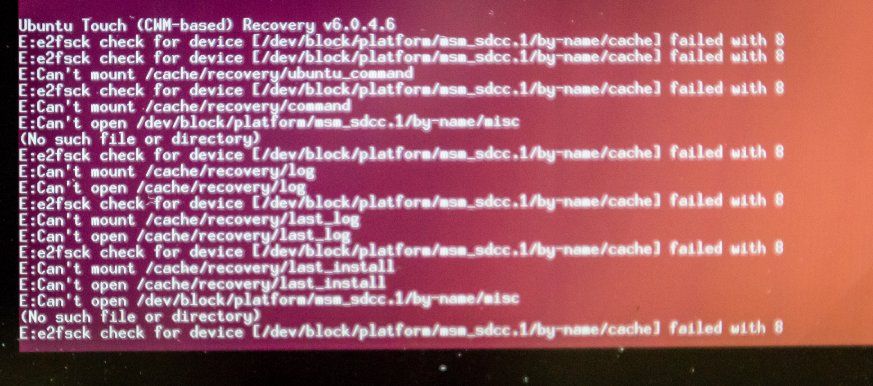Trouble with install on Nexus 7 2013 wifi (flo)
-
@flowbee have you seen / tested this https://github.com/ubports/ubports-installer/issues/782#issuecomment-510162269?
-
I see that new post about reformating the data partition with twrp. Yeah, I'll try that. It sounds like it may work given that fsck and mount are the error messages I'm seeing. I'm a little unsure how I could have a bad data partition given that other stuff seems to work fine. But, it's something to try... thanks again.
-
Well, using twrp to "repair" (seemed to be e2fsck) the filesystems ran fine, but the UT install still failed in the same way and I saw the same e2fsck errors (as shown in the images posted here). I also tried "adb shell" then running e2fsck -vf on each of the devices (cache, userdata, system) by hand. Again is ran fine, didn't find an errors. But, it didn't fix the issue either.
I'm not really sure what I'm doing. Perhaps the errors are actually something else (another filesystem?). Or, the issue is more subtle somehow (fstype somehow not right or superblock issue?) I'm not sure what in recovery is running e2fsck and what options it's using. Also, not sure what error 8 really means. Also, my filesystem seems to work fine otherwise, so it just seems odd.
But, it seems like an interesting line of inquiry, so I'll keep researching it.
-
@flowbee said in Trouble with install on Nexus 7 2013 wifi (flo):
Well, using twrp to "repair"
Maybe try to use UT recovery instead of twrp. That way you test with the same system that's used during install. Both twrp and UT recovery allow you to connect with and and run manual commands like e2fsck, mount, etc
-
Thanks for the idea. I'm using "adb shell" while my Nexus is in UT Recover. What I seem to be finding is that the block devices for cache userdata and system are not there. e.g.
% /etc/fstab
/dev/block/platform/msm_sdcc.1/by-name/cache /cache ext4 rw
/dev/block/platform/msm_sdcc.1/by-name/userdata /data ext4 rw
/dev/block/platform/msm_sdcc.1/by-name/system /system ext4 rwBut...
% ls /dev/block/
loop0 loop2 loop4 loop6 ram0 ram10 ram12 ram14 ram2 ram4 ram6 ram8 vold
loop1 loop3 loop5 loop7 ram1 ram11 ram13 ram15 ram3 ram5 ram7 ram9There's no "platform" directory in /dev/block!
I also found /tmp/recovery.log which seems to be the logfile and it gives more info on the "error 8" from e2fsck I'm getting:
/sbin/e2fsck: No such file or directory while trying to open /dev/block/platform/msm_sdcc.1/by-name/cache
Possibly non-existent device?
E:e2fsck check for device [/dev/block/platform/msm_sdcc.1/by-name/cache] failed with 8So yeah, that seems to confirm that /dev/block/platform/msm_sdcc.1/by-name/cache does indeed not exist and thus in the install fails with lots of errors when it tries to e2fsck or mount it.
But, I have no idea why /dev/block/platform/... doesn't exist or how to restore it.
Notably, twrp's recovery does have these devices and they seem fine. So, it seems like there's something off with UT's recovery and how it finds/creates devices, at least for my Nexus 7 (maybe it has slightly different hardware somehow?)
-
@flowbee I am pretty sure that the partitions/devices are there just not at these paths, what happens when you do in UT recovery, adb:
mount /cache mount ls -l /cacheand in twrp recovery, adb:
cat /etc/fstab mount /cache mount -
UT recovery, "adb shell":
~ # mount /cache
mount: mounting /dev/block/platform/msm_sdcc.1/by-name/cache on /cache failed: No such file or directory
~ # mount
rootfs on / type rootfs (rw)
tmpfs on /dev type tmpfs (rw,nosuid,relatime,mode=755)
devpts on /dev/pts type devpts (rw,relatime,mode=600,ptmxmode=000)
proc on /proc type proc (rw,relatime)
sysfs on /sys type sysfs (rw,relatime)
tmpfs on /storage type tmpfs (rw,relatime,mode=050,gid=1028)
tmpfs on /mnt/secure type tmpfs (rw,relatime,mode=700)
tmpfs on /mnt/fuse type tmpfs (rw,relatime,mode=775,gid=1000)
~ # ls -l /cache
~ #twrp recovery, "adb shell":
~ # cat /etc/fstab
/dev/block/mmcblk0p22 /system ext4 rw 0 0
/dev/block/mmcblk0p30 /data ext4 rw 0 0
/dev/block/mmcblk0p23 /cache ext4 rw 0 0
/usb-otg vfat rw 0 0
~ # mount /cache
mount: mounting /dev/block/mmcblk0p23 on /cache failed: Device or resource busy
~ # mount
rootfs on / type rootfs (rw,seclabel)
tmpfs on /dev type tmpfs (rw,seclabel,nosuid,relatime,mode=755)
devpts on /dev/pts type devpts (rw,seclabel,relatime,mode=600)
proc on /proc type proc (rw,relatime)
sysfs on /sys type sysfs (rw,seclabel,relatime)
selinuxfs on /sys/fs/selinux type selinuxfs (rw,relatime)
tmpfs on /tmp type tmpfs (rw,seclabel,relatime)
/dev/block/mmcblk0p30 on /data type ext4 (rw,seclabel,relatime,data=ordered)
/dev/block/mmcblk0p30 on /sdcard type ext4 (rw,seclabel,relatime,data=ordered)
/dev/block/mmcblk0p23 on /cache type ext4 (rw,seclabel,relatime,data=ordered)
~ # -
Note that on twrp recovery, /dev/block/platform/msm_sdcc.1/by-name/cache is a symlink:
/dev/block/platform/msm_sdcc.1/by-name/cache -> /dev/block/mmcblk0p23
On UT recovery, neither /dev/block/platform/msm_sdcc.1/by-name/cache nor /dev/block/mmcblk0p23 exists. You can see above where I did a "ls /dev/block" and just get loop* ram* and vold files on UT Recovery. On twrp, there are many more mmcblk* files as well as a platform/msm_sdcc.1 which seems to mostly be for symlinks that link back to /dev/block/mmcblk* files.
My impression is that for my Nexus 7 device, the dev/block/mmcblk* files don't get created, not do the symlinks under platform.
-
@flowbee strange . Do you have /dev/mmcblablah... ?
Edit: And can you pastebin your kernel log? I think you can get it with
adb shell dmesg > dmesg.log, ideally the UT rec and the twrp onesEdit2: is it this thing https://github.com/ubports/ubuntu-touch/issues/300 all over again? but why?
-
% ls /dev/mmc*
ls: /dev/mmc*: No such file or directoryHere's a: adb shell dmesg > dmesg.log
UT Recovery (exhibiting e2fsck errors): https://pastebin.com/k1ARAK5f
TWRP Recovery (normal/works for comparison): https://pastebin.com/AnJwjZFe
Yes, I'd seen: https://github.com/ubports/ubuntu-touch/issues/300 which lead me to install UB 16 to try their fixes, but I didn't get that far with it. You can clearly see people still having the issue at the end though. So, yeah...
-
Yeah, the more I read that 300 issue, the more I'm sure it's the same thing.
"Nexus 7 "flo" models, made in/after late 2014 and shipped with Android L have a different revision to their eMMC controller/hardware/something. Asus posted a kernel change:"
There's an image in https://github.com/ubports/ubuntu-touch/issues/300 that's identical to the e2fsk errors I have.
The trouble is the fixes posted are a bit stale... links no longer work. But, I did get the flo-newkernel-2.zip . And the recovery in that zip does not give the errors! I tried to take it further, and it even seemed to install, but I'm getting stuck in the google logo (as the askubuntu talks about). I'm going to try again tomorrow to follow the steps more exactly. I tried to do it with just fastboot on Windows since my UB 16 VM didn't seem to have a working ubuntu-device-flash. But, I can try harder to get that working if it's needed (not the same as flashboot?... they seem to use both tools, so probably not).
Anyway, something else to try... I'll try to report the bug or something too. And, if I do get UT running, I'll try to post my steps too.
-
@flowbee said in Trouble with install on Nexus 7 2013 wifi (flo):
% ls /dev/mmc*
ls: /dev/mmc*: No such file or directoryHere's a: adb shell dmesg > dmesg.log
UT Recovery (exhibiting e2fsck errors): https://pastebin.com/k1ARAK5f
right, UT has a
<3>[ 2.483093] mmc0: error -22 whilst initialising MMC cardTWRP Recovery (normal/works for comparison): https://pastebin.com/AnJwjZFe
while twrp has no error and instead detects the partitions:
<6>[ 2.714904] mmcblk0: p1 p2 p3 p4 p5 p6 p7 p8 p9 p10 p11 p12 p13 p14 p15 p16 p17 p18 p19 p20 p21 p22 p23 p24 p25 p26 p27 p28 p29 p30which is the line I was looking for and the UT version does not have this detection of partitions, just the error. that's definitely a problem and it does sound very much like #300
But, I did get the flo-newkernel-2.zip . And the recovery in that zip does not give the errors!
OK, that DEFINITELY sounds like #300 then. Workaround could be to use
ubuntu-device-flashcommand with the--recoveryswitch (syntax from memory might be called slightly different)@UniSuperBox remember good ol #300 plaguing flo? Could this have regressed? Did we do smt with the kernel images?
-
I'm a bit lazy to really read everything in this thread but in my experience, it's always better to install stock android first (I used Nexus Root Toolkit on mine) and then running the UBports installer.
And if you don't mind losing your data, then selecting Wipe might also help
-
@kugiigi said in Trouble with install on Nexus 7 2013 wifi (flo):
I'm a bit lazy to really read everything in this thread but in my experience, it's always better to install stock android first
after having seen this error:
<3>[ 2.483093] mmc0: error -22 whilst initialising MMC card
I am pretty sure that stock Android doesn't make a difference at this point
-
I've got Ubuntu Touch installed and running on my Nexus 7!
Yesterday after looking more closely at #300, I downloaded flo-newkernel-2.zip from https://github.com/ubports/ubuntu-touch/issues/300#issuecomment-450403133
After unzipping, from a Windows cmd window I did:
% fastboot flash boot flo-boot-new.img
% fastboot flash recovery flo-recovery-new.img'
then I did the manual install steps from https://devices.ubuntu-touch.io/device/flo, replacing recovery.img with flo-recovery-new.img for from the flash step. I noticed the recovery page no longer had the e2fsck errors. And, I saw the ubuntu logo with the progress bar slowly advancing (seemed to be installing). But, ultimately, it ended up stuck on the google logo screen. I think I reflashed the flo-*-new.img files as well. Close, but no cigar.Today, I booted up my Ubuntu 16 VirtualBox VM under Windows, got the usb sharing setup, installed adb and ubuntu-device-flash via https://repo.ubports.com/pool/bionic/main/g/goget-ubuntu-touch/ubuntu-device-flash_0.35+ubports+0~20181221200828.5~1.gbpd7daaa_amd64.deb linked from https://github.com/ubports/ubuntu-touch/issues/300#issuecomment-449490485
I ran it like so:
$ sudo ubuntu-device-flash touch --server=https://system-image.ubports.com --device=flo ----recovery-image=flo-recovery-new.img
2019/07/12 10:03:06 Device is |flo|
2019/07/12 10:03:07 Flashing version 7 from ubports-touch/16.04/stable channel and server https://system-image.ubports.com to device flo
2019/07/12 10:03:07 Start pushing /home/bill/.cache/ubuntuimages/ubports-touch/16.04/stable/flo/version-7.tar.xz to device
2019/07/12 10:03:07 Start pushing /home/bill/.cache/ubuntuimages/pool/keyring-4c4e7ef380ebcfa2c31084efa199138e93bfed8fc58aa3eb06bdf75a78af9b57.tar.xz to device
2019/07/12 10:03:07 Start pushing /home/bill/.cache/ubuntuimages/gpg/image-signing.tar.xz to device
2019/07/12 10:03:07 Start pushing /home/bill/.cache/ubuntuimages/gpg/image-master.tar.xz to device
99.48 KB / 371.72 MB [_____________________________________________________] 0.03 % 492.57 KB/s 12m52s2019/07/12 10:03:07 Done pushing /home/bill/.cache/ubuntuimages/ubports-touch/16.04/stable/flo/version-7.tar.xz to device
2019/07/12 10:03:07 Done pushing /home/bill/.cache/ubuntuimages/pool/keyring-4c4e7ef380ebcfa2c31084efa199138e93bfed8fc58aa3eb06bdf75a78af9b57.tar.xz to device
2019/07/12 10:03:07 Done pushing /home/bill/.cache/ubuntuimages/gpg/image-signing.tar.xz to device
2019/07/12 10:03:07 Done pushing /home/bill/.cache/ubuntuimages/gpg/image-master.tar.xz to device
61.89 MB / 61.89 MB [============================================================] 100.00 % 7.77 MB/s
2019/07/12 10:03:15 Start pushing /home/bill/.cache/ubuntuimages/pool/device-1481ee5bb7d4443bbc1506c297bc19aecc0520a305dca7a3ef800c57969ac9f4.tar.xz to device
371.72 MB / 371.72 MB [=========================================================] 100.00 % 11.28 MB/s
2019/07/12 10:03:40 Start pushing /home/bill/.cache/ubuntuimages/pool/ubports-420bfa80c833e7736e0197d969b5cd981f18eee1215ad3bfae6d82aab9105f03.tar.xz to device
2019/07/12 10:03:55 Done pushing /home/bill/.cache/ubuntuimages/pool/device-1481ee5bb7d4443bbc1506c297bc19aecc0520a305dca7a3ef800c57969ac9f4.tar.xz to device
2019/07/12 10:05:40 Done pushing /home/bill/.cache/ubuntuimages/pool/ubports-420bfa80c833e7736e0197d969b5cd981f18eee1215ad3bfae6d82aab9105f03.tar.xz to device
2019/07/12 10:05:40 Created ubuntu_command: /home/bill/.cache/ubuntuimages/ubuntu_commands361972522
2019/07/12 10:05:40 Rebooting into recovery to flashAnd, basically that just worked. Recovery had no errors, I saw the ubuntu logo with the progress bar (takes a few minutes), then it rebooted with Ubuntu Touch working.
I'm not sure how much what I did yesterday (the fastboot flashes) were important, but I'm mentioning them just in case. That 300 page seems to say you can do the fastboot flash's after as well. But, anyway, for anyone odd Nexus 7 owners like me who happen to see this: it is possible to get this installed. It says 16.04 (OTA-9) in about and seems to be generally working.
But yeah, it does seem like the bug from that 300 page wasn't actually fixed for the current installer somehow. But, otherwise the fixed imgs in the zip from 300 still works to fix it.
Thanks everyone for the help with this. I'm excited to be using Ubuntu Touch now!
-
@flowbee kudos! Enjoy your new UT device!!



-
This post is deleted!

